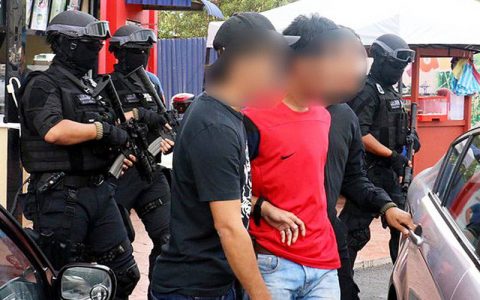
Malaysian scientist who ran al-Qaeda’s anthrax lab freed from police monitoring
A Malaysian scientist who once allegedly attempted to make weapons of mass destruction for al-Qaeda is now a “changed man”, says the country’s top counterterrorism official, and has been living a regular life since he was released from surveillance in November.
Yazid Sufaat, 58, an al-Qaeda operative who helped to set up a laboratory in Afghanistan to cultivate anthrax, had served a string of jail sentences in Malaysia for terror-related offences.
The US-trained biochemist was released in November 2019 after serving the maximum two-year period under the Prevention of Terrorism Act (Pota). He was placed under police surveillance and required to wear an electronic monitoring device.
Normah Ishak, head of the counterterrorism division in the Malaysian police force’s intelligence arm, said Yazid was removed from surveillance on November 21, 2021, and was now a “free man”.
“As such, he has the right to access the internet, including posting on Facebook and other social media pages,” Normah told This Week in Asia. She added that “we are in touch with him and remain friends.”
During the supervision order, Yazid was barred from going online, but was allowed to use the phone. He was also not allowed to leave his house between 8pm and 6am, although he could receive visitors.
Normah said Yazid now led a “normal life”, spending time with his family, working on his business, and getting involved with charitable activities.
“We are all humans … People can change for the better,” Normah said. “Yazid is a changed man now, and we all as members of the society should support him.”
Yazid graduated from California State University, Sacramento with a bachelor’s degree in biological science and chemistry in 1987.
The former army captain spent almost two decades of his life behind bars.
In January 2000, Yazid allowed his Kuala Lumpur flat to be used by senior al-Qaeda operatives, including two people who hijacked planes on 9/11, to discuss terror plots as part of a meeting known as the “2000 al-Qaeda summit”, according to the UN Security Council.
He was first detained for eight years under the Internal Security Act from 2002 to 2010. The law was replaced by the Security Offences (Special Measures) Act (Sosma) in 2012.
After Yazid’s release, he began recruiting new members for Islamic State in Syria. In 2013, he was rearrested under Sosma and jailed for four years in Perak state.
Then in 2017, he was rearrested and detained for two years, after it was found that he had been recruiting fellow inmates for al-Qaeda during his incarceration in Perak.
In an interview in 2018, Professor Zachary Abuza of the National War College in Washington DC said Yazid had come close to producing mass biological weapons together with Hambali, al-Qaeda’s Southeast Asia leader.
“The men had all the facilities and know-how to mass produce the biological weapon,” Abuza said. “But they did not have the Ames stain of anthrax, the most lethal strain that is used in anthrax weapons.”
In 2021, the counterterrorism police made only one arrest under the Prevention of Terrorism Act (Pota), Normah said. “She was a returnee from Syria and married to an Isis foreign fighter.”
There were no terror plots from 2020 to 2021, partly due to the coronavirus pandemic, she added. The counterterrorism force “took the opportunity to ensure it stays that way”.
“We intensified our online monitoring to implement ‘early detection, early intervention’, then neutralised the level of radicalism of the person of interest,” Normah said.
The duties of Malaysia’s Counter-Terrorism Division of the Special Branch include keeping in regular contact with former members of Jemaah Islamiah (JI), the group behind the 2022 Bali bombings.
They also conduct rehabilitation programmes for former detainees and prisoners of terrorism offences, on top of carrying out online surveillance and investigations.
To monitor Malaysians outside the country, the department works with partners to verify information in foreign databases, and maintains correspondence on details of international terrorists.
Speaking at an anti-terrorism webinar about Afghanistan on Wednesday, Normah said were no signs that Malaysians were heading to the Middle East country to fight for now, even as the Taliban had returned to power.
A total of 43 Malaysians were recorded to have returned from Afghanistan in the 1980s and 1990s. Of those, five had since died, said Normah at the webinar organised by the Centre for Radicalism and Deradicalisation Studies, Society against Radicalism and Violent Extremism, and Stratsea.
Normah added Afghanistan would not be another Syria, as foreign fighters thinking of flocking there were not likely to be motivated by “upholding an Islamic Caliphate” but were more interested to “train and gain experience with IS-Khorasan”, the Afghanistan affiliate of Isis.
Landlocked Afghanistan has many illegal exit and entry points courtesy of its mountainous terrain, Normah noted, making it a challenge to monitor fighters.
“Controlling the number of foreign fighters and charting their movements are keys to better security in our region,” Normah said. “The key to be one step ahead of our adversaries, whoever they are, is to always be prepared.”
Source: SCMP





